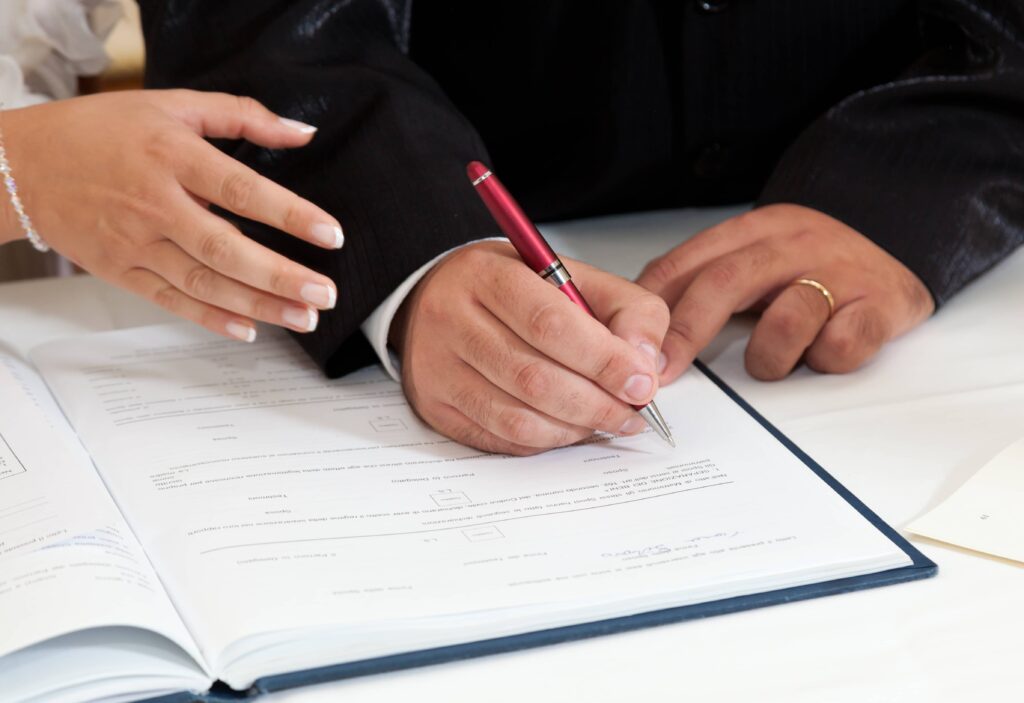Fast, Reliable, and Confidential
The Importance of Mobile Notary Services in International Adoption
When you’re maneuvering the complex world of international adoption, having reliable mobile notary services can make a significant difference. You’ll need notarized documents throughout the international adoption process, and mobile notaries bring their expertise directly to you, wherever you’re located. This process is crucial because it verifies signatures to confirm the identity of the signers, adding a layer of security and trust. This flexibility is invaluable, especially when adoption agencies set strict deadlines or when your documents for use must comply with the Hague Convention or specific foreign regulations. Mobile Notary Services save you time, reduce stress, and guarantee each signature is legally valid for the apostille process. By offering 24-hour service and secure handling, mobile notaries help you avoid costly delays and keep sensitive information confidential. Their knowledge of both local and international adoption requirements ensures your paperwork is always in order.


Essential Documents Required for International Adoption
To successfully complete an international adoption, you’ll need to gather several essential documents that prove your identity, stability, and suitability as an adoptive parent. Start with your birth certificates and those of the child, as these documents confirm identity and familial relationships. If you’re a couple, a marriage certificate demonstrates your legal union and household stability. A thorough home study report from a licensed agency shows that you’re prepared for parenthood and meet adoption standards. Don’t overlook criminal background checks—these help guarantee the child’s safety in your care. Financial statements are likewise necessary, proving your ability to provide for the child’s needs. Each essential document may require notarization and, in many cases, an apostille certificate to be accepted in the international adoption process.

Step-by-Step Process for Notarizing and Authenticating Adoption Papers
To get started, you’ll need to gather all the essential adoption documents before meeting with a licensed notary. Once notarized, you’ll move on to the apostille process to guarantee your papers are legally recognized abroad. Let’s walk through each step so you know exactly what to expect.
Gathering Essential Adoption Documents
Before you can move forward with an international adoption, you’ll need to gather a set of essential documents as outlined by your agency or legal advisor—typically including birth and marriage certificates, divorce decrees, home study reports, and financial statements. Collecting these documents early guarantees you’re prepared for each step of the process. For authenticity, each document usually requires notarization. Locate a licensed mobile notary public, present valid identification, and sign the documents in their presence to receive the official notary seal. Once notarized, assemble your documents in the order specified by your agency. Some countries will likewise require certified translations, which should be notarized for added authenticity. Careful preparation of your documents simplifies the process of securing an apostille later for your international adoption.
Completing Notarization and Apostille
Once you’ve gathered all your essential adoption documents, the next critical step is to assure they’re properly notarized and authenticated for international use. Start the process by presenting your documents to a licensed notary public, guaranteeing you provide valid identification and sign in their presence. Next, submit the notarized documents to the Secretary of State’s office for certification. Here, officials verify the notary’s credentials and attach a certification, confirming your documents are legally recognized. For international adoptions, you’ll need to obtain an apostille from Apostille Services if your child’s country is part of the Hague Convention. For non-Hague countries, follow consular legalization steps at the relevant embassy. Remember, if translations are needed, verify certified translations are likewise notarized before proceeding.
Understanding Apostille and Legalization for Overseas Adoption
As you prepare for international adoption, you’ll need to understand the difference between an apostille and legalization, since each process depends on the country involved. If your child’s country is part of the Hague Convention, you’ll follow specific apostille requirements—otherwise, legalization may be necessary. Make certain you gather and prepare all essential documents early to meet these requirements smoothly.
Apostille Versus Legalization
During the process of traversing international adoption, you’ll often encounter the terms “apostille” and “legalization” when preparing your documents. Both serve to confirm the authenticity of a document, such as adoption documents, so they’ll be accepted by foreign authorities. If your child’s country of origin is a member of the Hague Apostille Convention, you’ll use the apostille process, which requires notarization and then certification by the appropriate state authority—no further steps are needed. If the country isn’t a member, you’ll need legalization, which involves multiple certifications, sometimes including the Department of State and the embassy or consulate. Knowing whether you need an apostille or legalization guarantees your process of international adoption isn’t delayed by missing or invalid document authentication.
Hague Convention Requirements
Understanding the difference between apostille and legalization sets the stage for meeting the specific requirements of the Hague Convention in international adoption. When your adoption agency requests documents for an overseas placement, you’ll need to follow the Hague Convention’s authentication process. For countries that are signatories, you must obtain an apostille to verify the authenticity of the notary’s signature and seal on your important documents. This guarantees your paperwork meets international adoption standards and is recognized abroad. Here’s how you comply:
- Collect all important documents, such as birth certificates and home study reports.
- Confirm each document meets the notary needs for your state.
- Submit documents to the appropriate authority for apostille certification.
- Communicate with your adoption agency to guarantee every step follows Hague Convention requirements.
Essential Document Preparation
During preparing for international adoption, you’ll need to gather essential documents like birth certificates, marriage certificates, home study reports, and criminal background checks. These documents must be notarized and may require an apostille to confirm their authenticity for use in your child’s country. The apostille process is vital if you’re adopting from a Hague Convention country, as it validates documents for legal acceptance abroad. If your child’s country isn’t part of the Hague Convention, consular legalization is necessary instead. Early preparation is key—each state has specific steps and fees to obtain an apostille, and processing times can vary. Using a mobile notary can simplify the process, letting you authenticate documents efficiently, keeping your adoption on track, and helping you avoid unnecessary delays.
Key Requirements for Notaries Handling Adoption Documents
Although notarizing adoption documents may seem straightforward, you’ll need to meet several specific requirements to confirm your work is accepted by adoption agencies. To handle international adoption paperwork effectively, follow these steps to make certain the documents are properly executed and to save you time in the long run:
Notarizing adoption documents requires careful attention to detail and specific requirements to ensure acceptance by international adoption agencies.
- Review the documents thoroughly, checking preprinted wording and certificate accuracy before you start the process, especially with power of attorney forms.
- Make certain your commission has at least one year left and remains valid throughout the post-placement period—this helps verify the authenticity and consistency of your work.
- Use an embosser if required, as it adds an extra layer of security that agencies often demand.
- Understand your state’s specific notary laws to avoid errors that could cause costly delays or rejections.

Overcoming Challenges in International Adoption Notarization
After covering the fundamental requirements for notaries handling adoption documents, it’s clear that international adoption brings its own set of challenges. You’ll need to handle a significant volume of documents, each with unique requirements depending on the country. To maneuver through this, start the process early and review all the necessary paperwork thoroughly. Mobile notary services can save time by providing flexible, on-site assistance, minimizing travel and appointment hassles. Engaging professionals well-versed in Nevada notary laws ensures compliance and prevents delays. Staying updated on local and international regulations is vital; missing a single detail could delay your adoption process. Verify your notary commission is valid for at least another year to avoid complications. The following table highlights common obstacles and effective approaches:Overcoming Challenges in International Adoption Notarization
After covering the fundamental requirements for notaries handling adoption documents, it’s clear that international adoption brings its own set of challenges. You’ll need to handle a significant volume of documents, each with unique requirements depending on the country. To maneuver through this, start the process early and review all the necessary paperwork thoroughly. Mobile notary services can save time by providing flexible, on-site assistance, minimizing travel and appointment hassles. Engaging professionals well-versed in Nevada notary laws ensures compliance and prevents delays. Staying updated on local and international regulations is vital; missing a single detail could delay your adoption process. Verify your notary commission is valid for at least another year to avoid complications. The following table highlights common obstacles and effective approaches:
| Challenge | Solution | Benefit |
|---|---|---|
| High document volume | Mobile notary services | Save time |
| Varied country needs | Early process, thorough review | Avoid rejections |
| Tight timelines | Start process early | Meet deadlines |
| Legal compliance | Stay informed, valid commission | Smooth handling |
| Error risk | Double-check documentation | Successful notarization |
What our customers say

need more information?
Frequently Ask Questions.
Got questions? We’ve got answers. Whether you’re curious about mobile notary services, pricing, or what documents we can notarize, you’ll find quick, helpful info below.

Our mobile notary service brings a professional notary to your location at a time that’s convenient for you. Simply schedule an appointment, and we’ll handle the rest—whether you’re at home, the office, or another location.
Yes, a valid, government-issued photo ID is required for all notarizations. This includes driver’s licenses, passports, or other forms of identification accepted by state regulations.
Absolutely! We offer flexible scheduling, including evenings and weekends, to accommodate your needs. Our goal is to provide convenient and reliable notary services whenever you need them.
Notarizations:
For taking an acknowledgment , for the first signature of each signer: $15
Each signer first signature: $15
For each additional signature of each signer: $7.50
Administering an oath or affirmation: $7.50
Executing a Jurat for each signature on the affidavit: $15
Travel Fee: 6 a.m. - 7 p.m. : $30
7 p.m. - 6 a.m. :$60


